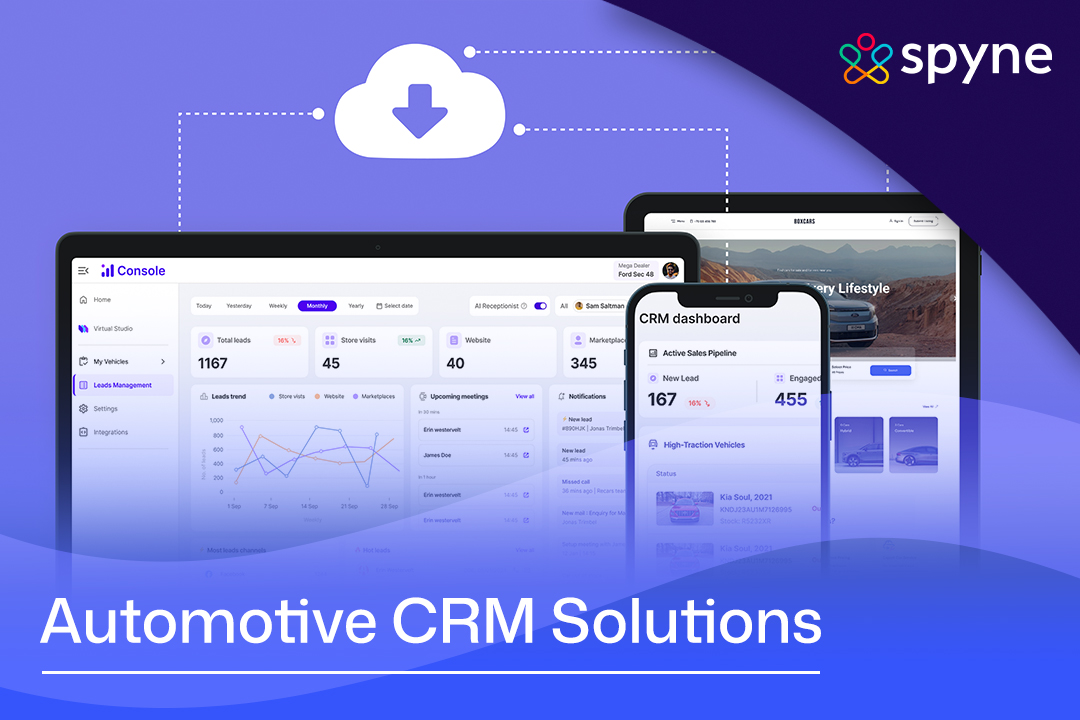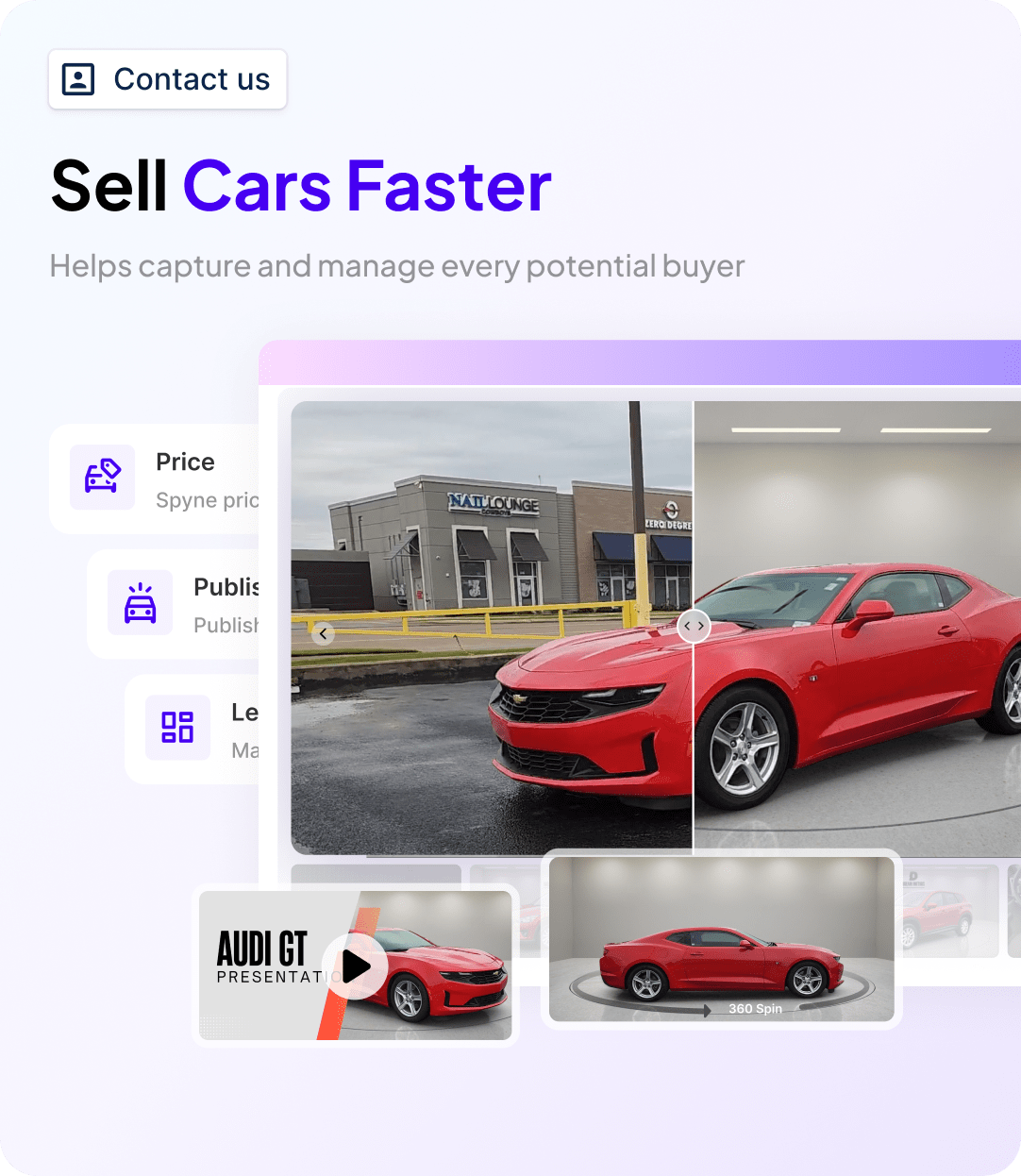Selling cars today is no longer about what’s sitting on your lot; it’s about how smartly you manage your operations behind the scenes. From lead management and inventory tracking to capturing beautiful vehicle images and improving online visibility, today’s dealerships use automotive software to keep things running smoothly and customers smiling. In this blog, we’ll explore the most powerful automotive software solutions in 2025, with a spotlight on how Spyne helps dealerships scale faster with AI-powered photography, intelligent CRM, and real-time analytics.
What is Automotive Software for Car Dealerships?
Automotive software for car dealerships is a digital tool that helps dealers run their business more smoothly. Instead of using manual methods or multiple systems, dealerships can use this auto dealer software to manage everything from car inventory and customer information to sales, marketing, and service, all in one place.
This type of software is designed to make dealership operations quicker and simpler. For instance, it helps dealerships monitor the cars they have on hand, so they never run out or overstock. It also organizes customer information, so dealers can remain connected with them, follow up, and provide a more personalized experience.
Additionally, car dealership software provides dealerships with data on what sells, what customers are looking for, and how they are performing as a business. This allows for better decision-making, improves marketing, and improves sales.
As the car business becomes increasingly digital, this type of auto software is essential to helping dealerships compete. It saves time, avoids errors, and helps provide a better customer experience, online and in-store.
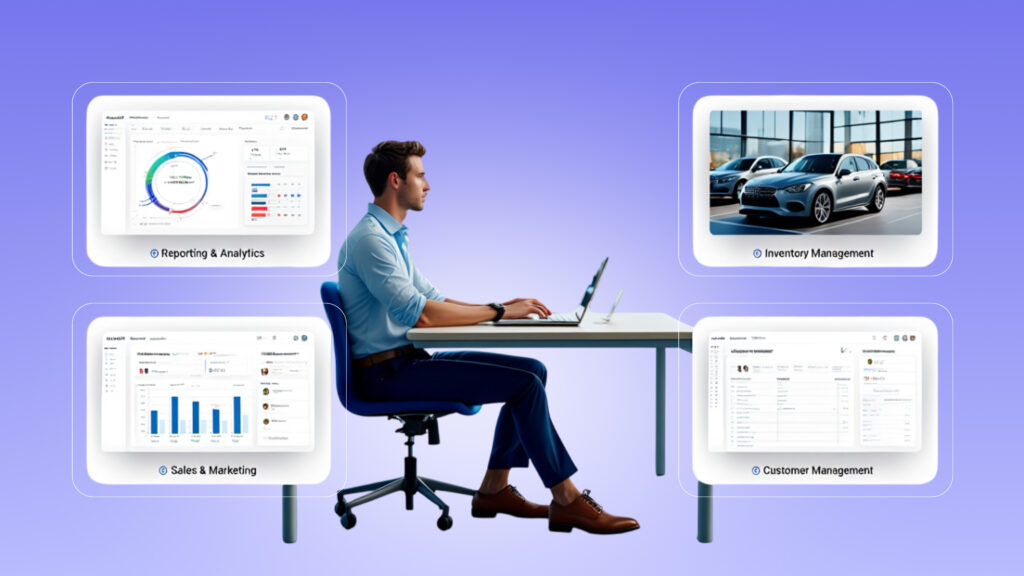
List of Top Automotive Software for Car Dealerships in 2025
Explore the best automotive software providers of 2025 offering smart inventory, CRM, and website solutions tailored for car dealerships.
Automotive website providers
1. Spyne
Spyne is a top AI-powered automotive software firm known for transforming how dealerships build and sustain their online presence. Focusing on speed, personalization, and SEO, Spyne’s website solutions allow car dealerships to drive more leads and realize faster conversions.
Key Features:
- AI Website Builder: Build contemporary, professional, mobile-friendly websites with no coding knowledge.
- Integrated Inventory Management: Easily sync and update your car listings on the site and third-party marketplaces.
- Studio-Grade Images for Web: High-quality, automatically enhanced images tweaked specifically for web performance and looks.
- Marketplace & CRM Integration: One-click share to Facebook Marketplace and dealership CRM integration.
- SEO Optimization: Sites have keyword-content, quick loading speed, and responsive design to rank higher in search engines.
2. Dealer eProcess
Dealer eProcess is a well-established digital solution provider to car dealerships, offering high-performance web platforms designed to drive leads and improve user experience. Their data-driven designs focus on maximizing conversion and operational efficiency.
Key Features:
- Responsive Design: Seamlessly operates on all devices with fast-loading pages.
- Digital Retailing Tools: Built-in finance calculators, trade-in functionality, and online credit apps.
- SEO & SEM Services: Tools to help improve organic rankings and paid traffic.
- Inventory Display System (IDS): Fully customizable rich media vehicle listings.
- Accessibility Compliance: ADA-compliant websites for increased reach.
- Data Integration: Real-time sync with DMS and CRM systems.
3. Dealer Inspire
Dealer Inspire is a world-class automotive technology company that unites innovation and performance. Renowned for new, intelligent websites, Dealer Inspire excels in enhancing the digital retailing experience for both dealers and customers.
Key Features:
- Online Car Buying (Online Shopper): Enable customers to complete vehicle purchases on their own devices.
- Custom WordPress Websites: Designed for speed, flexibility, and SEO.
- Conversational AI (Ana Bot): Smart chatbot that converts leads 24/7.
- Real-Time Inventory Integration: Keeps up-to-date vehicle listings.
- Advanced Analytics: Track user behavior and automotive marketing ROI.
- Full Suite Integration: CRM, service scheduling, and digital advertising in one platform.
4. DealerFire
DealerFire is a member of the DealerSocket family and provides tailored website solutions built for performance. Their websites focus strongly on user experience, SEO, and content marketing to get dealerships noticed in a competitive online market.
Key Features:
- Custom Website Design: Brand-specific experiences for every dealership.
- SEO-First Architecture: Next-generation optimization strategies for local and national search.
- Inventory Management: Real-time synchronization and merchandising tools for vehicles.
- Content Management System (CMS): Dealer-friendly backend and simple to update.
- Responsive & Mobile-Friendly: Optimized layouts for every screen size.
- Integrated Marketing Tools: Supports PPC, retargeting, and dynamic content.
5. CDK Global
CDK Global is a behemoth in the automotive retail software market, offering enterprise-level web solutions and dealership management systems. Their web sites are stable, scalable, and built for large dealer networks.
Key Features:
- CDK Websites: Professionally designed and optimized for automotive retail.
- Connected Retailing: Connection between digital experience and in-store visits.
- Inventory Syncing: Real-time updates from DMS to website listings.
- Personalized Content: Capabilities to tailor offers and inventory by shopper behavior.
- Advanced Reporting: Actionable insights into website traffic and conversion.
- Seamless DMS Integration: Fully compatible with CDK’s Dealer Management Systems.
Automotive CRM provider
1. Spyne
Spyne provides cutting-edge, AI-driven automotive CRM services specifically designed for car dealerships. With its user-friendly dashboard and extensive automation, Spyne’s CRM enables dealerships to handle customer relationships more effectively, monitor sales opportunities, and recover lost leads more effectively.
Key Features:
- Unified CRM Dashboard: Keep all customer communications texts, emails, calls, and walk-ins- in a single dashboard.
- Lead Tracking and Recovery: Monitor customer paths and automatically re-engage lost leads.
- AI-Driven Customer Engagement: 24/7 chatbots and auto-follow-ups to grab and cultivate leads.
- In-Depth Sales Insights: View in-depth reports on customer activity to enhance targeting and sales efforts.
- Smooth Integration: Simple integration with inventory, website, and marketing systems.
2. CDK Global
CDK Global is a top automotive dealership software company, providing dealership management systems and robust CRM solutions. Their CRM is built to integrate sales, service, and marketing activities for a complete customer experience.
Key Features:
- End-to-End Lead Management: From initial inquiry to last sale, monitor every customer interaction.
- Automated Follow-Ups: Customized messaging workflows to engage customers throughout the buying process.
- Marketing Automation: Email campaigns and promotions based on customer interests.
- Mobile CRM Access: Manage customer information and communications on the go.
- Service Integration: Connect CRM with service scheduling and repair order management.
3. DealerSocket, Inc.
DealerSocket is a trusted name in automotive software CRM, providing smart tools that help dealerships build stronger customer relationships and sell more cars. Their solutions focus heavily on customization and deep customer engagement.
Key Features:
- Customizable Sales Pipelines: Tailor your CRM processes to match your dealership’s unique workflows.
- Lead Scoring and Prioritization: Prioritize and target high-potential leads.
- Automated Communications: Automatically send emails, texts, and task reminders based on customer behavior.
- Comprehensive Reporting: Track team performance and customer interaction rates.
- Mobile-First CRM: Complete functionality from any mobile device.
4. VinSolutions Inc.
VinSolutions provides an integrated automotive CRM solution named Connect CRM, which aims to consolidate customer information and streamline dealership operations. It assists salespeople in providing customized experiences by having all customer information in one location.
Key Features:
- Integrated Customer Profiles: Merge sales, service, and marketing data into a single complete profile.
- Smart Appointment Scheduling: Set and monitor appointments for test drives, service appointments, and more with ease.
- Behavioral Targeting: Recommend action based on customer browsing and interaction history.
- Task Automation: Auto-assigns tasks to sales reps for streamlined follow-up.
- DMS Integration: Integrates easily with large Dealer Management Systems.
5. AutoRaptor
AutoRaptor CRM is designed specifically for independent and franchise automotive dealerships. Simple, intuitive, and easy to use, AutoRaptor assists dealerships in capturing, organizing, and closing leads fast.
Key Features:
- Ease-of-Use Lead Management: Intuitive system for tracking and managing all leads.
- Text and Email Integration: Interact in real-time with leads using integrated messaging features.
- Workflow Automation: Automate rules for reminders, follow-ups, and notifications.
- Reporting and Analytics: Track team activity and customer history of interaction.
- Mobile CRM App: Complete CRM access using smartphones and tablets.
Automotive Inventory software providers
1. Spyne
Spyne provides intelligent, AI-powered automotive inventory management solutions for used car dealerships. Through real-time data insights and computerized stock recommendations, Spyne enables dealers to make quicker decisions, enhance vehicle turnover, and fulfill customer demand more effectively.
Key Features:
- Real-Time Inventory Insights: Monitor your inventory health and market demand in a snap.
- AI-Based Sourcing Suggestions: Receive tailored suggestions on what vehicles to stock according to market trends.
- Multi-Channel Sync: Automatically list and sync vehicles across your website, social media, and marketplaces such as Facebook.
- Smart Pricing Tools: Apply AI to automatically optimize vehicle pricing based on competing listings and demand.
- Inventory Analytics: Determine what vehicles sell the best and where to find similar units.
2. AutoManager, Inc.
AutoManager is a respected brand in automotive software with a solid emphasis on inventory management through its DeskManager system. It’s perfect for independent dealerships in need of flexibility and simplicity.
Key Features:
- Centralized Inventory Dashboard: All vehicle information is viewable, manageable, and updated in one convenient interface.
- Automated VIN Decoding: Quickly fill out vehicle information with a quick VIN scan.
- Online Marketplace Integration: Publish listings to sites like Cars.com, Autotrader, and Craigslist in a single click.
- Photo Management: Upload and manage vehicle photos directly from your device.
- Lot Management Tools: Monitor vehicle location, reconditioning status, and delivery phases.
3. CDK Global
CDK Global brings powerful inventory tools together with rich dealership integrations. Their system assists both franchise and large independent dealers in maintaining control of vehicle inventory, supply chain, and sales readiness.
Key Features:
- Inventory Lifecycle Tracking: Track vehicles from purchase to ultimate sale.
- DMS Integration: Sync inventory with sales, finance, and service departments.
- Vehicle Reconditioning Status: Track and manage the condition and availability of every vehicle.
- Automated Stock Updates: Update your website and sales channels with up-to-date listings instantly.
- Performance Analytics: Analyze which vehicles sell quicker and optimize your buying strategy.
4. DealerCenter
DealerCenter is an integrated car dealer management software with enhanced inventory management features. Built for independent dealers, it makes everything from vehicle purchases to online listings easy.
Key Features:
- Real-Time Inventory Control: Add, modify, or remove vehicles with ease and control your lot anywhere.
- Auction Integration: Purchase inventory from auctions such as Manheim and automatically upload vehicle information.
- Online Listings Management: Send your inventory to large platforms with one click.
- Vehicle History Reports: Integrate with AutoCheck and CARFAX for instant insights.
- Mobile Inventory Tools: Snap vehicle photos, scan VINs, and update listings via mobile app.
5. Dealertrack DMS
Dealertrack DMS, a Cox Automotive company, provides franchise dealers with enterprise-level inventory tools designed to make dealerships run more efficiently. Their solution focuses on real-time synchronization, solid integrations, and complete visibility into inventory processes.
Key Features:
- Live Inventory Sync: Keep your inventory accurate across departments and channels.
- Vehicle Acquisition Tools: Coordinate sourcing, trades, and buys in one location.
- Automated Reconditioning Workflow: Assign and monitor vehicle prep tasks to get inventory sales-ready more quickly.
- Analytics and Forecasting: Gain insights into stocking trends, turn rates, and pricing strategies.
- OEM Integration: Sync your stock with manufacturer programs and systems easily.
How Spyne’s Automotive Software Helps Car Dealerships?
Spyne’s artificial intelligence-powered dealer’s automotive software helps used car dealerships become more digitalized and offer customers a better experience. From managing stock to designing professional websites, here’s how Spyne helps every step of the selling process:
1. Manage Customer Relationships with Connect. ai CRM
Spyne’s automotive CRM helps dealerships track every interaction with the customer, from lead generation through final sale. You can trace down leads and follow up, personalize conversations, and never miss a deal. The CRM even tells you where the leads come from so that you can focus your efforts where they matter.
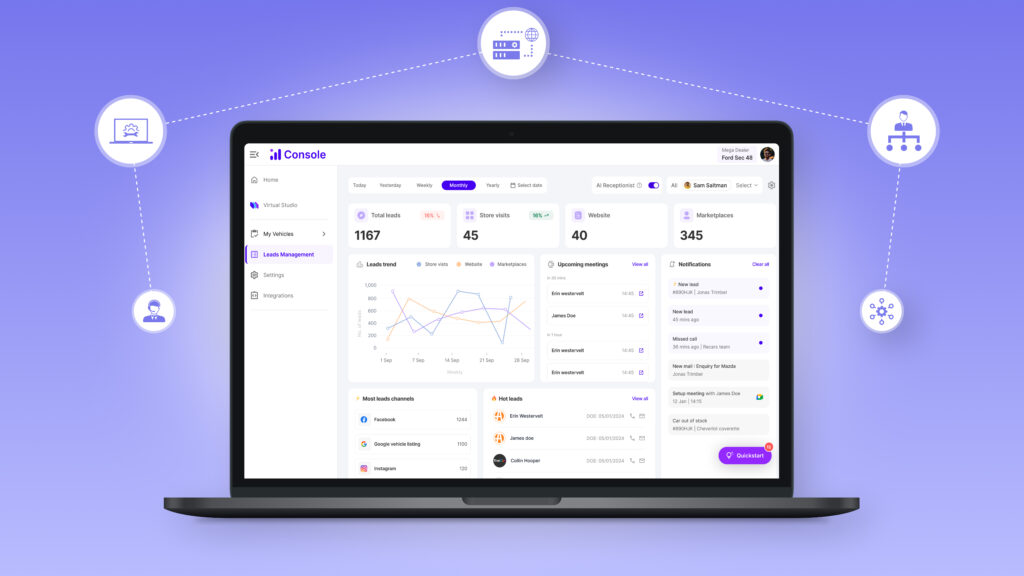
2. Smarter Inventory Management with AI
Spyne’s Inventory AI indicates to you which cars to stock up on based on customer demand and market trends. It gives you real-time information so you can buy and list the best-selling cars.
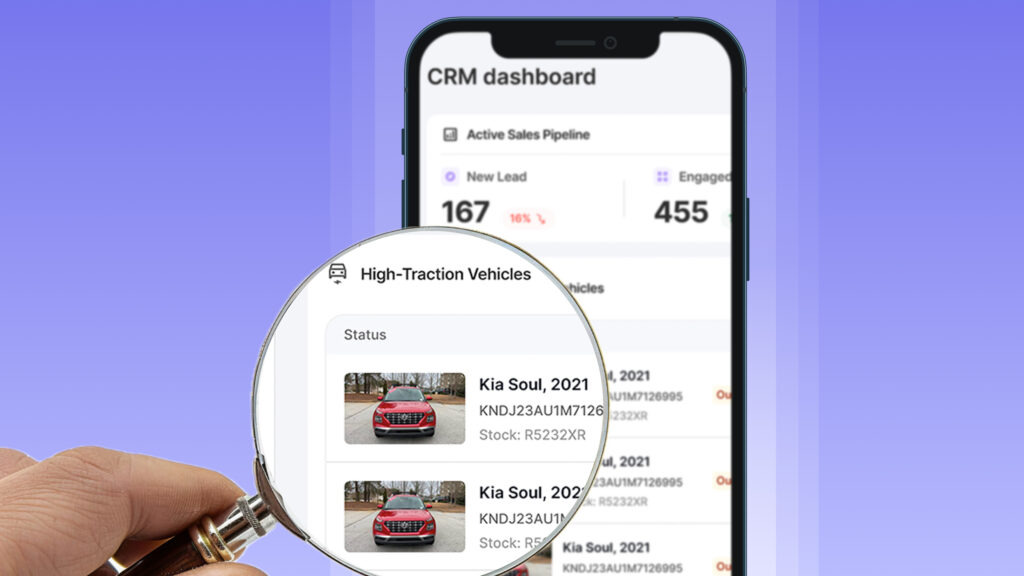
3. Get Studio-Quality Images with Studio AI
Use Studio AI to convert ordinary car pics into clean, HD, studio-quality images. Add interactive features like 360° spins and video tours to make your listings more appealing and gain customer trust.
4. Close More Deals with Automated Marketing
Spyne’s car software runs automated marketing campaigns on what your buyers are searching for. It sends the right messages at the right time, whether it’s a text, an email, or a social media ad, to bring back leads and speed up decision-making.
5. Improve Website Visibility with Automotive SEO
Our combined automotive SEO services boost your site’s ranking on Google. Spyne optimizes your sites with fast load rates, keyword-convenient content, and mobile responsiveness that brings more traffic and leads to your site.
6. Create Stunning Sites with Our Website Builder
Spyne’s AI car dealer website Builder makes it easy to create a professional, search engine-optimized site without writing code. Add car listings, quality images, and lead forms to bring serious buyers and boost conversions.
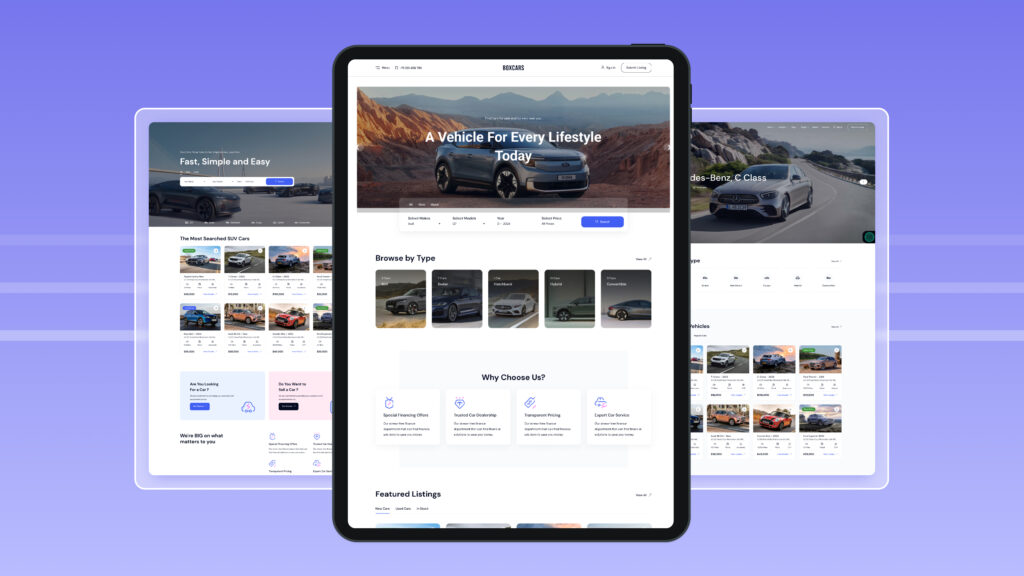
7. Talk to Buyers Across Channels
With Spyne, interact with customers through email, SMS, social networks, and even marketplaces like Facebook. Send personalized offers, servicing reminders, and car recommendations all from one platform.
8. Marketplace Integration for Broader Reach
Spyne simplifies syncing your listings to leading automotive marketplaces. No more uploading the same car repeatedly, just update it once on Spyne, and it is live everywhere. This saves time and increases your visibility.
9. Host Customers 24/7 with Virtual Agents
Spyne’s virtual representatives, callbots and chatbots, are available to you 24/7. They answer customer questions, record calls, update CRM history, and even negotiate prices so you can make sales even when you’re not around.

10. Lead Recovery and Follow-ups Simplified
Spyne helps recover lost leads through automated follow-ups and behavior-based retargeting. Even if a lead drops off, Spyne continues the conversation, increasing your chances of converting them later.
Conclusion
Vehicle dealership software is transforming how dealerships operate, helping them streamline processes, boost online visibility, and drive more sales. From managing leads and inventory to creating high-quality vehicle visuals and enhancing the customer experience, the right automotive software tools can make all the difference. Spyne’s all-in-one car dealership management software brings AI-powered imaging, CRM, and intelligent analytics together to help dealerships scale faster and smarter. Whether you’re selling used cars or running a large franchise, Spyne gives you the edge to stay competitive in a digital-first world. Book a free demo today and see how Spyne can accelerate your dealership’s growth in 2025 and beyond.

